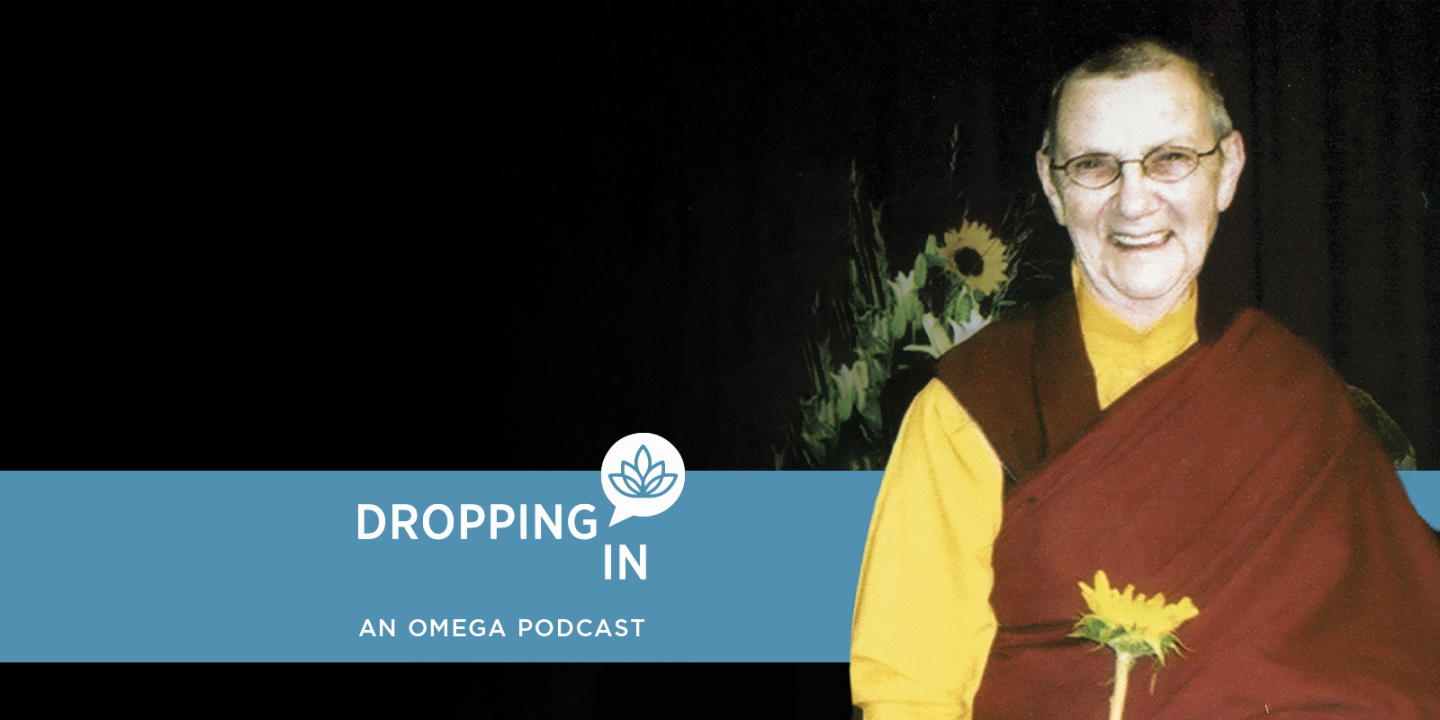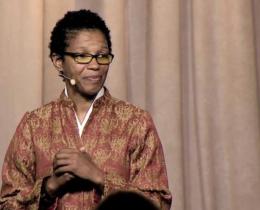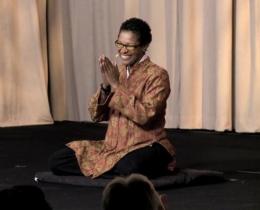Cali Alpert:
Welcome to Dropping In from Omega Institute. I'm Cali Alpert. Due to the COVID-19 pandemic, our Rhinebeck, New York campus is temporarily closed, but we're still here for you. Now, instead of dropping in on campus in real time, we're dropping into our treasure trove of audio archives to offer you talks, teachings, and practices from some of Omega's most memorable workshops and conferences. Today, excerpted from Omega's 2005 Overcoming Obstacles Conference, the late Buddhist nun and teacher Ani Trime offers a 22-minute talk on coping with a complaining mind. Later, Ani leads a nine-minute meditation practice to help you release negative thinking and recognize whether or not your thoughts are actually true. Put some time aside for yourself, get comfortable, make sure you're not behind the wheel, and drop in.
Ani Trime:
I work with a lot of senior citizens because I'm one of those, and we talk not about negative mind, about complaining mind. And senior citizens got it down. We've got it down. We've been practicing a long time. But you're working up to it pretty quick.
When we begin to recognize through meditation and observing the thoughts that arise in our mind, we're overwhelmed with how negative we are about so many things. And when I talk about this, people say, "But I love to complain." Yeah, that's true for most of us. When we can discriminate between what we can help by our complaint and what we are just getting ourselves all tight about because a complaining mind turns into a tight body and a tight life.
It's kind of normal for we as human beings to complain, and we do get a little bit of joy out of it. If you say you don't, then I'm going to call you an untruthful person. When, through meditation, we discover, we're told, and you've been told a lot of stuff in your life, but meditation is finding out for yourself. All of us are different because of our different experiences, so our conceptual mind sees things differently. For instance, if I see you and I have my ideas of blah, blah, Pittsburgh. So forth. I will look at you probably differently than somebody that's never been to Pittsburgh. I had my first drink of whiskey in Pittsburgh, Pennsylvania. That was a long time ago.
Why do we complain? Usually we complain because of fear. Fearful of maybe many, many things. And this is—you've heard the word ego? And people want to get rid of their ego? Good luck. But ego is not to be gotten rid of. We don't try to get rid of ego. We just try to see what it does, and because ego causes all these sort of negative things we encounter, we have to realize that ego actually is characterized by fear, and it thrives on pessimistic exaggeration, negative exaggeration.
There's a lot of programs out today that talk about these many, many things that we talk about from meditation point of view, but through this pessimistic exaggeration, we get depressed. We become anxious. We have doubt about ourselves mostly. We're talking about ourselves tonight and this weekend. We're going to—usually I work with breath and something that's called many things. We're going to use slogans, using in breath, out breath. And what we're going to do is plant seeds in this garden of mind. It works in many different ways. It's almost simplistic when we get into doing it, and we're going to look at all these areas where we might find negativity and see how it actually affects us.
There's a guy called—I heard this many years ago—Deepak. Deepak Chopra. You remember him? You know him? Anyway, he was talking one time about destructive negative emotions. And he said, when you frown, because each cell in your body has a little mind, so when you frown, all your body frowns. And when you smile, all your cells smile. They're doing this little dance. I kept that image in my mind all these years. I don't know when he said it, but a long time when he wasn't quite so sophisticated as he is today. We're going to begin with meditation, and I will give you meditation instruction, and then we're going to do it. And the object of this meditation is to notice your thoughts. You're all thinking. We're all thinking. I'm thinking, you're thinking, and it never stops.
A prerequisite for meditation is posture. You can't meditate unless you're sitting up straight. In the sitting meditation, it's important that we're relaxed. When you're relaxed, your shoulders are relaxed. Your belly is soft. Your back is straight. And then this posture, we're not rigid. Check your belly. Let it be real soft. Let it be relaxed. And then you begin to feel the breath go all the way down to your navel.
The instruction is when you notice that you're thinking, you don't try to stop it, get rid of it. You don't chase after it. You simply notice that you're thinking. That's it. You just notice that you're thinking and then bring your mind once again to the breath.
Let's correct the posture a little bit. Head is erect, but the chin is not in the air. If your chin goes up in the air, you go off on a little trip of your own. If your head is down, you're normally, what most of us do as human beings, we'll feel depressed, and your breath is not passing freely through your nostrils into your lungs. We keep the head erect, shoulders relaxed, belly soft, and then you allow your weight to actually sink into your seat. But you're not holding up your torso with your shoulders. The eyes actually are slightly open, gazing down about four feet ahead of you.
Now, the first slogan that we're going to use tonight, and we use it on the in breath and out breath ... As we breathe in, we're going to say these words: I am willing to release as we breathe out all negative thoughts. Once again, as we breathe in, I am willing to release all negative thoughts.
With every in breath and every out breath, if you wander away, very gently come back. Try to remember what we're saying. As we breathe in, I am willing to release all negative thoughts.
Maybe saying the words "I am willing to release" causes you some problem. Then you would change it to what you can handle saying, "I will try to release negative thoughts. I will try to release negative thoughts."
I am going to sound this gong, and then you just simply do the meditation without the thinking about it. Now, you go back to just the breath coming in, filling your lungs, the breath leaving your body, dissolving into the atmosphere. Thought arising. Notice it. And very gently, once again, come back to the breath. Shoulders are relaxed. Belly is soft. Eyes are partially open.
Now, you can relax a little bit, loosen up.
Does anybody have any questions? Are you asleep? Are you sure?
When you encountered the phrase, "I am willing," some people balk at that because our negative thoughts are quite juicy and interesting. We get a lot of energy from them. That's not to say that all negative thoughts are bad. We're not saying that. I don't want to imply that. There are some things that automatically bring up negativity. What we're basically talking about is what I mentioned before, just complaining mind, how we complain if things aren't right. It's too hot, it's too cold, it's raining, it's not raining, so forth. That's complaining mind. It's not accepting. And so when we live with that kind of complaint all the time, we're not very happy people.
The Dalai Lama ... You've heard of the Dalai Lama, I suppose. Most people have. He says that, "The purpose of our life is to be happy." It's something that we can choose to be regardless of the chaos that goes on around us because you are indeed an island unto yourself. And when you learn to work with your mind and to see what your perceptions are, how you notice that something's not right, then you might ask yourself ... I have a bumper sticker on the back of my car. It says, "You don't have to believe everything you think," which is true. You don't have to believe everything you think because we think our thoughts are very solid and they're always right. Right? Yes? We do.
But then we can question that if it's giving us a little grief. We can actually go and question it. Is what I'm thinking, which is hurting me so much, is this really true? Like I know she doesn't like me. How do you know? Where does that come from? Because somebody was thinking about their car payment is due, and they had a frown on their face, and you thought it was for you. Sorry. You're not the center of everybody's world. Just your own.
Most of us are really locked into concepts and ideas about ourselves. And we can question those, too. I'm too fat. I'm too skinny. I'm too ugly. I'm too old. Which is all true about me, but we all have these ideas. It doesn't bother me, I might add. But anyway, that's what it is. We all have an idea about ourselves. Can't stretch this extra half inch or I can't stand still on one foot.
But if you believe that is possible, then by George, pretty soon it will be. And that applies to everything that we're doing. I don't mean that you're all going to be super people. Everybody has their own degree of limitation. But we all actually have much more potential, and whatever direction we want to go, then we use or proceed towards.
Look at the ideas about yourself that you have, and ask yourself if they're true. Pema tells a story about ... Most of you know Pema, I'm sure. Pema Chödrön. She tells a story about walking down the street and hearing somebody said as she walked by, "She's really ugly." And she went home and in her—this is when she's living on the West Coast—and she looked in the mirror, and she says, "By George, they're right?" But that's not always the case.
But always question because there are negative things that happen. What we're talking about this weekend is actually looking at things and finding our reaction to them. If our constant reaction is negativity regardless, then we have to do something about it. And as I said before, there are negative things. And this is not a course in positive thinking. It's a course in reality and looking at really how you're thinking because your thinking, your mind is what rules your life. No external circumstances rule your life. As hard as that is to understand because we were blaming the war, the this, the that, whatever, and it is truly a concern. But when you come down to your own little individual world, which is right here, right now, then what's happening? What's really happening?
Tibetan teachers always have this argument: Did you know me before you saw me tonight? And they say, yeah, no, you never saw me before. You did not know me. You only heard about me. And it couldn't go on because people get really upset with that kind of discussion because they always say, yes, we knew about you. But that's not the same as knowing what's really happening right now.
And I use another slogan, which is very handy, and it's very simple. It says, "In this moment, my life is perfect. In this moment, my life is perfect." And you'd be surprised if you can remember that. In a time of stress, that comes in very handy. It gives you a little bit of space, gives you a little one-second vacation. In this moment, my life is perfect. Because your life is perfect in this moment. The only reason it's not perfect is you thinking about the past or thinking about the future. But in this moment, which also happens when you're sitting, that is the moment. The only thing that's happening when you're sitting on this cushion is your breath and your thoughts. Nothing else is happening.
Do we have any disagreement with that? There isn't any, but we very rarely do that. Once I got a birthday card. I had a birthday not very long ago. It was quite clever. It had a little person sitting on the front, and it said, "There is no path. There is no future." And I opened it up, and it said, "There is no present."
Cali Alpert:
Thanks for dropping in with us. If you enjoyed today's episode, please check out our many online learning opportunities featuring more of your favorite teachers and thought leaders. Visit the learn online section on EOmega.org for more information. Dropping In is made possible in part by the support of Omega members. Help Omega remain a source of hope and healing and receive special content, invitations, and discounts designed to support Omega's engaged community of members. Visit EOmega.org/membership today.



